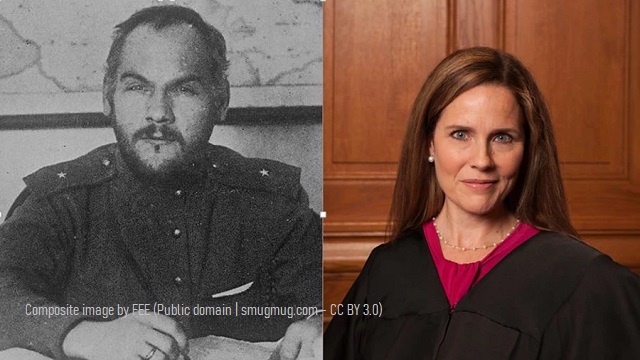ACB’s Grilling is Strikingly Soviétique

Judge Amy Coney Barrett and the Krylenko Test. At the Senate hearings for the Barrett nomination, it was apparent the first day that the Judge was being Krylenkoed.
By any standard, Judge Amy Coney Barrett appears to be a superbly qualified, first-rate nominee to the US Supreme Court. That would normally be a widely shared and bi-partisan perspective of someone with her experience and reputation, but these are hardly normal times. They are hyper-politicized, ultra-partisan, politically correct, and hysterically ideological times.
For example: Until this nomination, “court-packing” meant stuffing a bench with additional justices. To a significant number of public figures who ought to know better (and probably do), court-packing now is when a President exercises his constitutional duty to nominate a single person to fill a vacancy. George Orwell would call this startling transformation of court-packing “Newspeak.”
As in Orwell’s 1984, the purpose of today’s Newspeak is to serve the interests of power and power-seekers, no matter what, the truth be damned. Politics is everything to this crowd. It is apparently what makes their lives worth living, which is a profoundly sad commentary on their balance and priorities. To cast aside such values as fairness and honesty for the sake of political power is about as anti-social as human behavior gets.
As I watched the first day of hearings on Judge Barrett’s nomination, I was reminded of a largely forgotten Soviet legal theoretician from decades ago. His name was Nikolai Krylenko. Judge Barrett is being given the Krylenko treatment by Democrat senators like Cory Booker and Kamala Harris, meaning this: The only thing that matters is whether she will vote their party line in future cases.
Under the communist dictatorship of Lenin and then Stalin, Krylenko (1885-1938) rose through the Soviet Union’s legal system to become People’s Commissar for Justice and a Prosecutor General. He was a leading practitioner of the theory of “socialist legality,” which held that an accused person’s innocence or guilt depended on that person’s politics (real or imagined). It sounds nuts and indeed, it was. It was the stuff of Orwell’s nightmare, and one of the reasons the Soviet Union thankfully perished of its own poison.
In The Gulag Archipelago, the famous Soviet dissident and Nobel laureate Aleksandr Solzhenitsyn recounted an episode involving Krylenko. Shortly after Lenin’s Bolsheviks assumed power in 1917, an admiral named Shchastny was sentenced by one of the regime’s judges “to be shot within 24 hours.” When some in the courtroom expressed shock, it was Krylenko who responded thusly: “What are you worrying about? Executions have been abolished. But Shchastny is not being executed; he is being shot.”
To Krylenko, the only morality was what served the Party and the State, which of course in the Soviet Union were one and the same. If your politics were not correct, you would be “corrected,” one way or the other. In Richard Pipes’ authoritative book, The Russian Revolution, Krylenko is quoted as exclaiming, “We must execute not only the guilty. Execution of the innocent will impress the masses even more.”
At the Senate hearings for the Barrett nomination, it was apparent the first day that the Judge was being Krylenkoed. Hostile senators pronounced their verdicts before she had uttered a word, and those verdicts had nothing to do with Barrett’s stellar qualifications or keen legal mind. Legal analyst and George Washington University Law School professor Jonathan Turley commented,
What they were suggesting is that they will be voting against her because of what they expected her vote would be in a pending case, and that is a conditional confirmation…Here, the senators seem to be saying, “I’m not even going to listen; I’m going to vote against you because I don’t think you’re going to vote the right way….”
Judge Barrett clearly articulated her judicial philosophy, borne out by the way she has ruled at the US Court of Appeals for the Seventh Circuit: She believes the role of a judge or justice is to follow the Constitution and the law as written, not make stuff up in the service of a political agenda. How ironic that this is a point of fiery contention. Senators who swore an oath to uphold the Constitution and the law hate the guts of a judge who does just that!
Perhaps Amy Coney Barrett should tell those hostile senators, “If the Constitution stands in the way of your ideology, I’ll gladly scrap it on your behalf. All power to the State!” She would pick up a few votes in the process.
What happened to Nikolai Krylenko? It’s called “what goes around, comes around.” The very system of politicized, arbitrary judgments he wielded against his fellow citizens came back to bite him. He lost favor with the politicians (namely, Stalin) and fell victim to the Great Purge of 1938. Accused of anti-Party activity, he was tortured until he “confessed” to crimes he never committed and summarily executed.
The rule of law did not exist in the Soviet Union of Joseph Stalin and Nikolai Krylenko. In its place, what prevailed was the rule of men—power-mad men of no conscience. Civilized people will not pity the likes of Krylenko, but they will always regret the innocent that his “legal theory” victimized. Shame on us if we allow his brand of evil to ever take root among us.
COLUMN BY
Lawrence W. Reed
Lawrence W. Reed is FEE’s President Emeritus, Humphreys Family Senior Fellow, and Ron Manners Global Ambassador for Liberty, having served for nearly 11 years as FEE’s president (2008-2019). He is author of the 2020 book, Was Jesus a Socialist? as well as Real Heroes: Incredible True Stories of Courage, Character, and Conviction and Excuse Me, Professor: Challenging the Myths of Progressivism. Follow on LinkedIn and Twitter and Like his public figure page on Facebook. His website is www.lawrencewreed.com.
EDITORS NOTE: This FEE column is republished with permission. ©All rights reserved.


Leave a Reply
Want to join the discussion?Feel free to contribute!